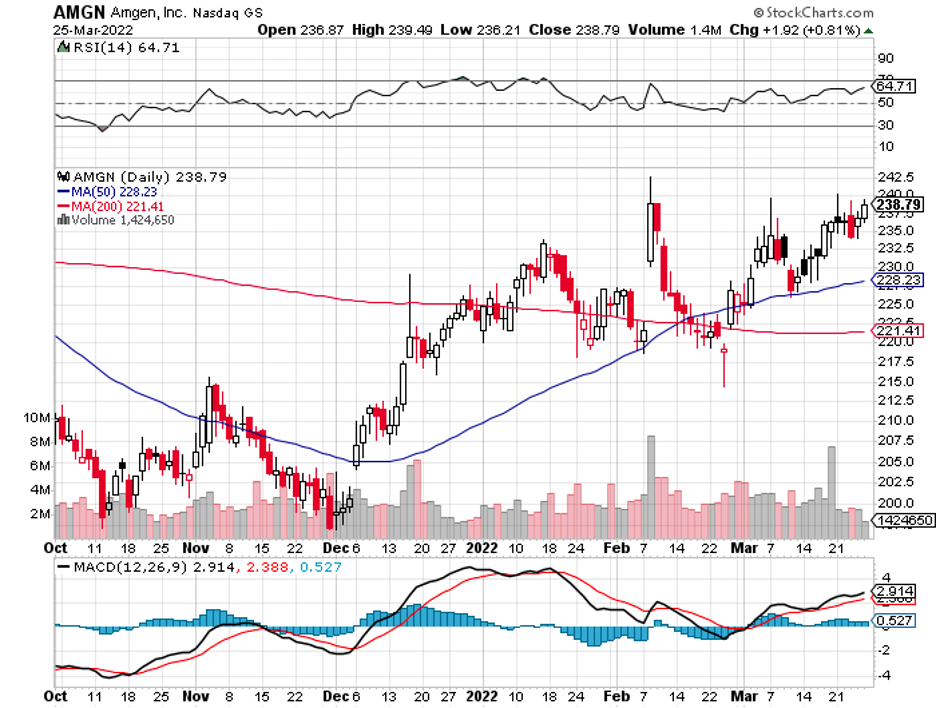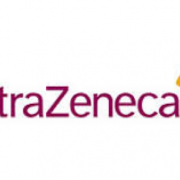A Durable and Enduring Stock in These Troubled Times
The latest market sell-off has motivated me to take a closer look at blue-chip businesses with solid track records of bringing value to shareholders regardless of the economic conditions.
After all, an insistence on putting money only in the highest quality stocks is key to long-term success in investing.
And when investing in the biotechnology and healthcare industry, it’s vital to choose stocks with robust drug portfolios and promising pipelines of candidates. This ensures continuous solid growth in the near and long run.
Amgen (AMGN) fits that description.
Over the years, Amgen has risen as one of, if not the most prominent biotechnology company. This company is one of the largest and possibly longest-running biotechnology businesses in the world.
It is a leader in various sectors, including oncology, blood disorders, cardiology, inflammation, and immunology. It has also expanded in other segments, with “King of Biologics” as the latest moniker for this biotech titan.
Amgen has been consistently profitable throughout its history, sustaining industry-leading margins that boost both its top and bottom-line growth.
Founded in 1980, it has steadily made a name for itself following the approval of its first drug —anemia treatment Epogen — in 1989.
Since then, this biotechnology stalwart has evolved into a significant player in the industry with a market capitalization of roughly $130 billion and an enterprise value of approximately $156 billion.
This translates to the company demonstrating a solid balance sheet on top of a robust repurchase program and an impressive track record of increasing its dividends.
Amid the sluggish economic climate in 2021, Amgen pulled $26 billion in total revenue to record a 6% climb year-over-year in adjusted EPS.
This improvement in its performance was fueled by its remarkable portfolio of branded drugs and biosimilars.
Naturally, the next question is whether the company can sustain this growth.
For 2022, Amgen announced a guided total revenue within the range of $25.4 billion and $26.5 billion.
In 2023, the company anticipates an accelerating growth primarily due to the US launch of the all-around immunology injection Amgevita, the expansion of psoriasis and psoriatic arthritis Otezla’s label, and additional momentum from future blockbusters severe asthma treatment Tezspire and non-small cell lung cancer oral therapy Lumakras.
Looking at the track record, the company estimates potential mid-single-digit growth in revenues from these products and over double-digit increase in EPS.
Moreover, the company has an impressive pipeline of roughly 40 innovative candidates. The programs include 10 cutting-edge molecules advancing through mid- and late-stage trials.
Among these are biosimilars for blockbuster products such as Johnson & Johnson’s (JNJ) Crohn’s disease treatment Stelara, and AstraZeneca’s (AZN) blood disorder drug Soliris.
If these get the green light, then each biosimilar could siphon hundreds of millions of dollars in yearly revenue from these competitors.
In particular, Amgen’s work on a biosimilar for AbbVie’s (ABBV) severe rheumatoid arthritis treatment Humira could generate substantial sales for the company.
Its burgeoning biosimilars programs and other pipeline candidates contribute to predictions that Amgen could record at least 7% in annual earnings growth over the next five years.
More importantly, Amgen offers a market-beating 3.3% dividend yield, making it an attractive investment with incredible growth potential.
As the market continues to make sense of the effects of inflation, the continuing conflict between Ukraine and Russia, and the constant threat of rate hikes, it has become essential to come up with a list of top quality companies that can offer steady growth and a healthy dividend.
Thus far, Amgen has been excellent at delivering on both counts.
It’s a great biotechnology company with a very solid history and, judging from its pipeline candidates, an even more solid future.


